Exploring Leadership, Power, Politics, and Conflict in Unilever
VerifiedAdded on 2023/06/11
|11
|3169
|232
Report
AI Summary
This report provides an academic analysis of leadership, power, politics, and conflict within organizations, using Unilever as a case study. It explores the concept of power in leadership and business, analyzing Machiavelli’s The Prince and French and Raven’s 6 Bases of Power theory. The report evaluates the concept of politics in relation to the Michael Jarrett model, examining different types of organizational politics and their impact. It also discusses the nature and impact of conflicts within organizations, including common causes and management strategies, highlighting Unilever's approach to conflict resolution using a cooperative model. The reflective statement summarizes the key learnings about the effective use of power, the negative impacts of organizational politics, and the importance of creating a healthy workplace environment to minimize conflicts and enhance employee motivation and organizational performance. Desklib provides a platform for students to access similar solved assignments and past papers.
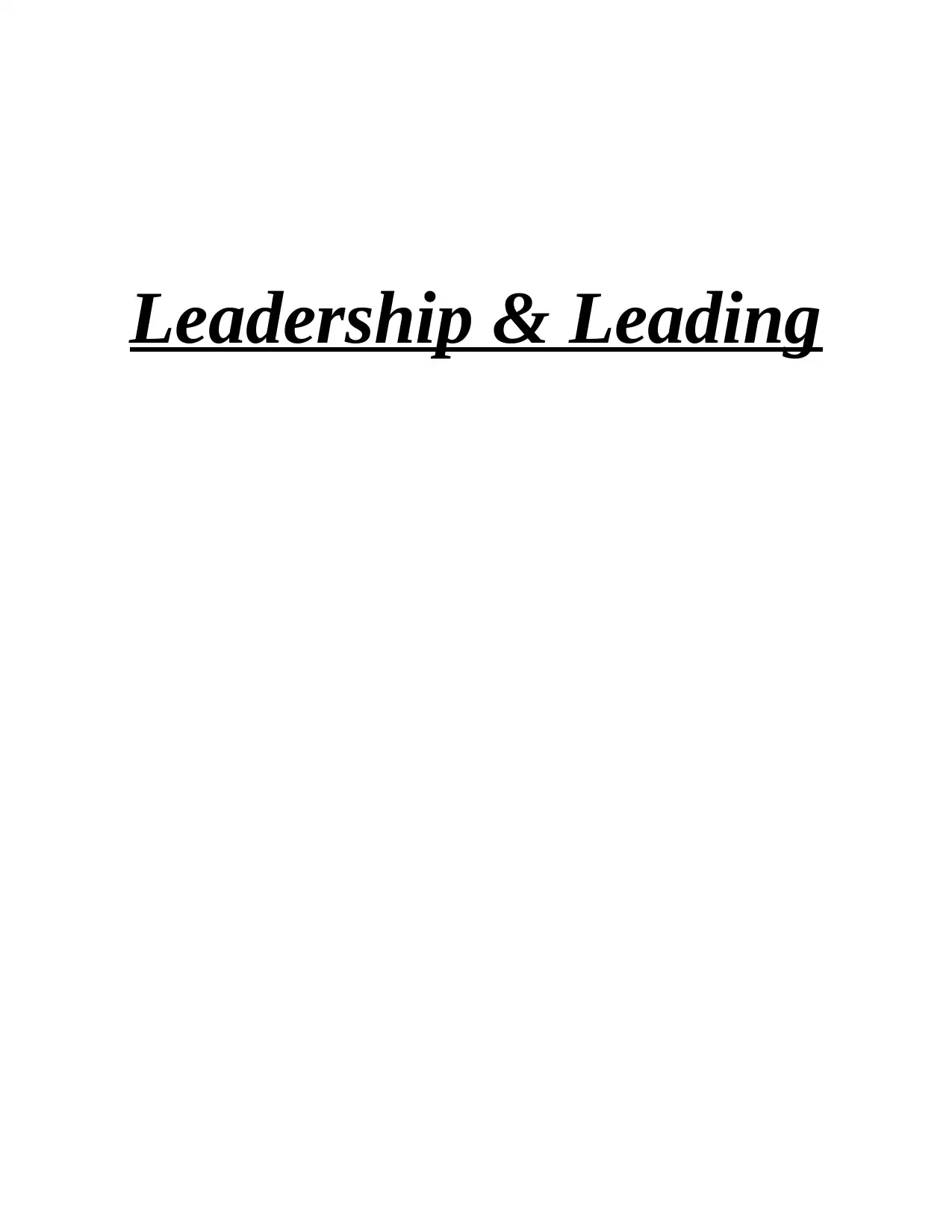
Leadership & Leading
Paraphrase This Document
Need a fresh take? Get an instant paraphrase of this document with our AI Paraphraser
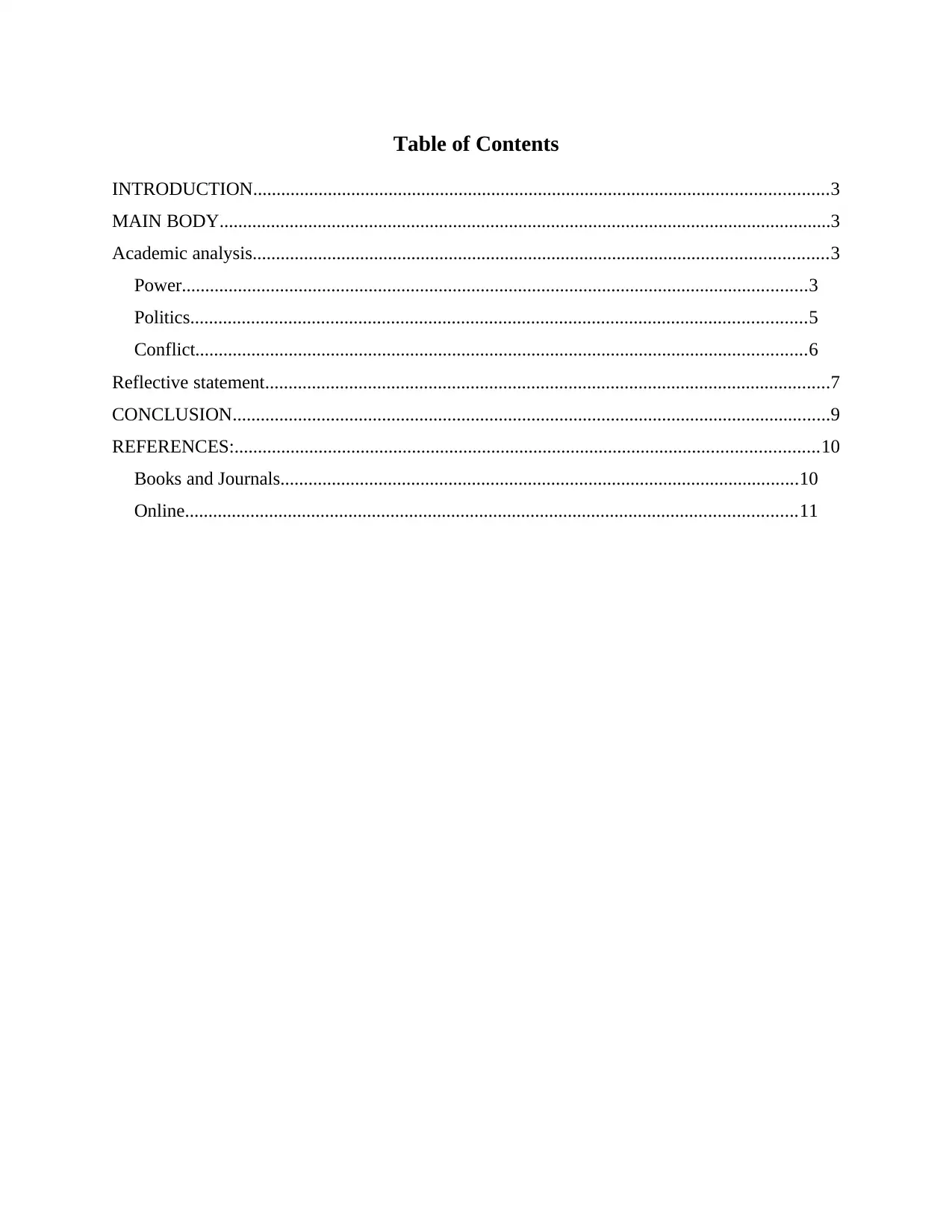
Table of Contents
INTRODUCTION...........................................................................................................................3
MAIN BODY...................................................................................................................................3
Academic analysis...........................................................................................................................3
Power......................................................................................................................................3
Politics....................................................................................................................................5
Conflict...................................................................................................................................6
Reflective statement.........................................................................................................................7
CONCLUSION................................................................................................................................9
REFERENCES:.............................................................................................................................10
Books and Journals...............................................................................................................10
Online...................................................................................................................................11
INTRODUCTION...........................................................................................................................3
MAIN BODY...................................................................................................................................3
Academic analysis...........................................................................................................................3
Power......................................................................................................................................3
Politics....................................................................................................................................5
Conflict...................................................................................................................................6
Reflective statement.........................................................................................................................7
CONCLUSION................................................................................................................................9
REFERENCES:.............................................................................................................................10
Books and Journals...............................................................................................................10
Online...................................................................................................................................11
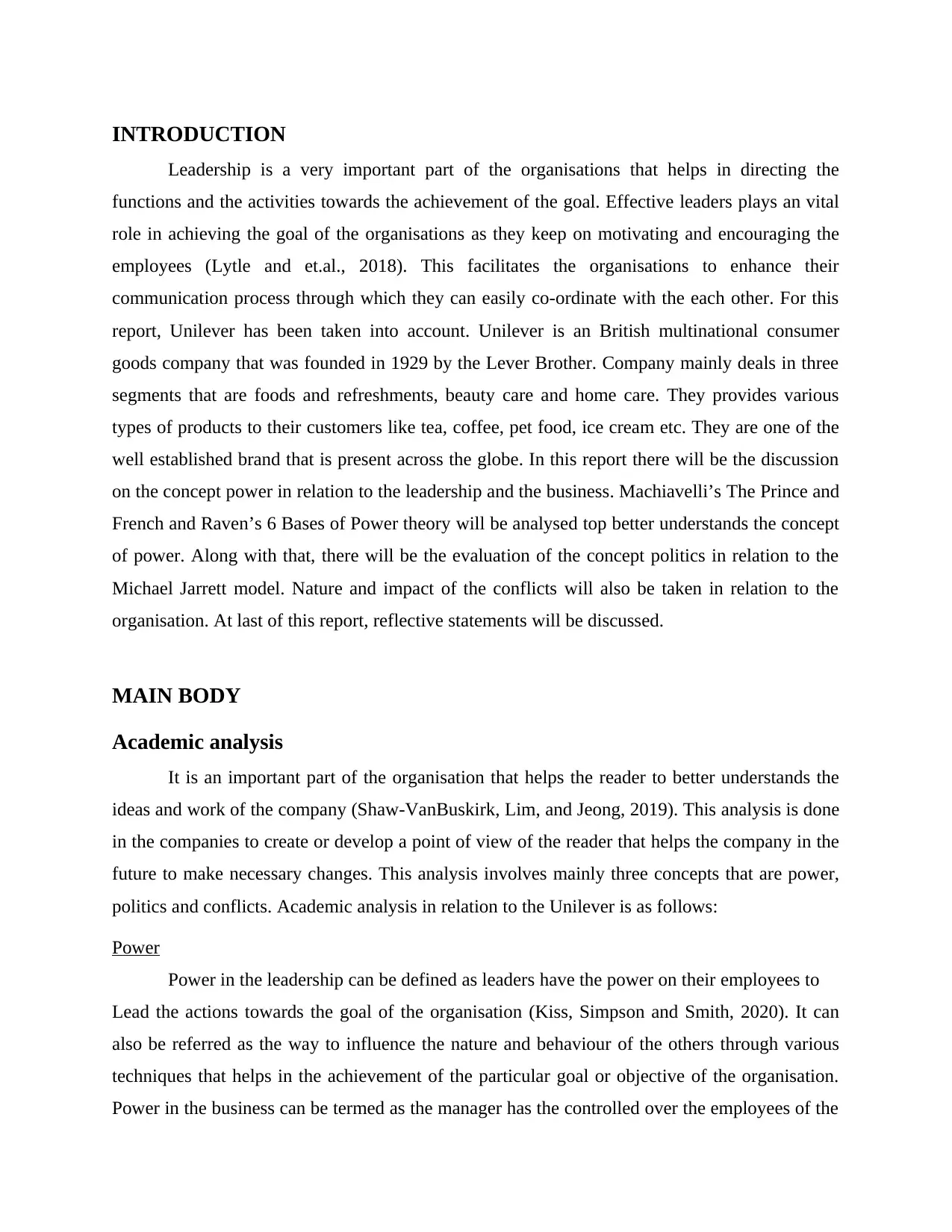
INTRODUCTION
Leadership is a very important part of the organisations that helps in directing the
functions and the activities towards the achievement of the goal. Effective leaders plays an vital
role in achieving the goal of the organisations as they keep on motivating and encouraging the
employees (Lytle and et.al., 2018). This facilitates the organisations to enhance their
communication process through which they can easily co-ordinate with the each other. For this
report, Unilever has been taken into account. Unilever is an British multinational consumer
goods company that was founded in 1929 by the Lever Brother. Company mainly deals in three
segments that are foods and refreshments, beauty care and home care. They provides various
types of products to their customers like tea, coffee, pet food, ice cream etc. They are one of the
well established brand that is present across the globe. In this report there will be the discussion
on the concept power in relation to the leadership and the business. Machiavelli’s The Prince and
French and Raven’s 6 Bases of Power theory will be analysed top better understands the concept
of power. Along with that, there will be the evaluation of the concept politics in relation to the
Michael Jarrett model. Nature and impact of the conflicts will also be taken in relation to the
organisation. At last of this report, reflective statements will be discussed.
MAIN BODY
Academic analysis
It is an important part of the organisation that helps the reader to better understands the
ideas and work of the company (Shaw-VanBuskirk, Lim, and Jeong, 2019). This analysis is done
in the companies to create or develop a point of view of the reader that helps the company in the
future to make necessary changes. This analysis involves mainly three concepts that are power,
politics and conflicts. Academic analysis in relation to the Unilever is as follows:
Power
Power in the leadership can be defined as leaders have the power on their employees to
Lead the actions towards the goal of the organisation (Kiss, Simpson and Smith, 2020). It can
also be referred as the way to influence the nature and behaviour of the others through various
techniques that helps in the achievement of the particular goal or objective of the organisation.
Power in the business can be termed as the manager has the controlled over the employees of the
Leadership is a very important part of the organisations that helps in directing the
functions and the activities towards the achievement of the goal. Effective leaders plays an vital
role in achieving the goal of the organisations as they keep on motivating and encouraging the
employees (Lytle and et.al., 2018). This facilitates the organisations to enhance their
communication process through which they can easily co-ordinate with the each other. For this
report, Unilever has been taken into account. Unilever is an British multinational consumer
goods company that was founded in 1929 by the Lever Brother. Company mainly deals in three
segments that are foods and refreshments, beauty care and home care. They provides various
types of products to their customers like tea, coffee, pet food, ice cream etc. They are one of the
well established brand that is present across the globe. In this report there will be the discussion
on the concept power in relation to the leadership and the business. Machiavelli’s The Prince and
French and Raven’s 6 Bases of Power theory will be analysed top better understands the concept
of power. Along with that, there will be the evaluation of the concept politics in relation to the
Michael Jarrett model. Nature and impact of the conflicts will also be taken in relation to the
organisation. At last of this report, reflective statements will be discussed.
MAIN BODY
Academic analysis
It is an important part of the organisation that helps the reader to better understands the
ideas and work of the company (Shaw-VanBuskirk, Lim, and Jeong, 2019). This analysis is done
in the companies to create or develop a point of view of the reader that helps the company in the
future to make necessary changes. This analysis involves mainly three concepts that are power,
politics and conflicts. Academic analysis in relation to the Unilever is as follows:
Power
Power in the leadership can be defined as leaders have the power on their employees to
Lead the actions towards the goal of the organisation (Kiss, Simpson and Smith, 2020). It can
also be referred as the way to influence the nature and behaviour of the others through various
techniques that helps in the achievement of the particular goal or objective of the organisation.
Power in the business can be termed as the manager has the controlled over the employees of the
⊘ This is a preview!⊘
Do you want full access?
Subscribe today to unlock all pages.

Trusted by 1+ million students worldwide
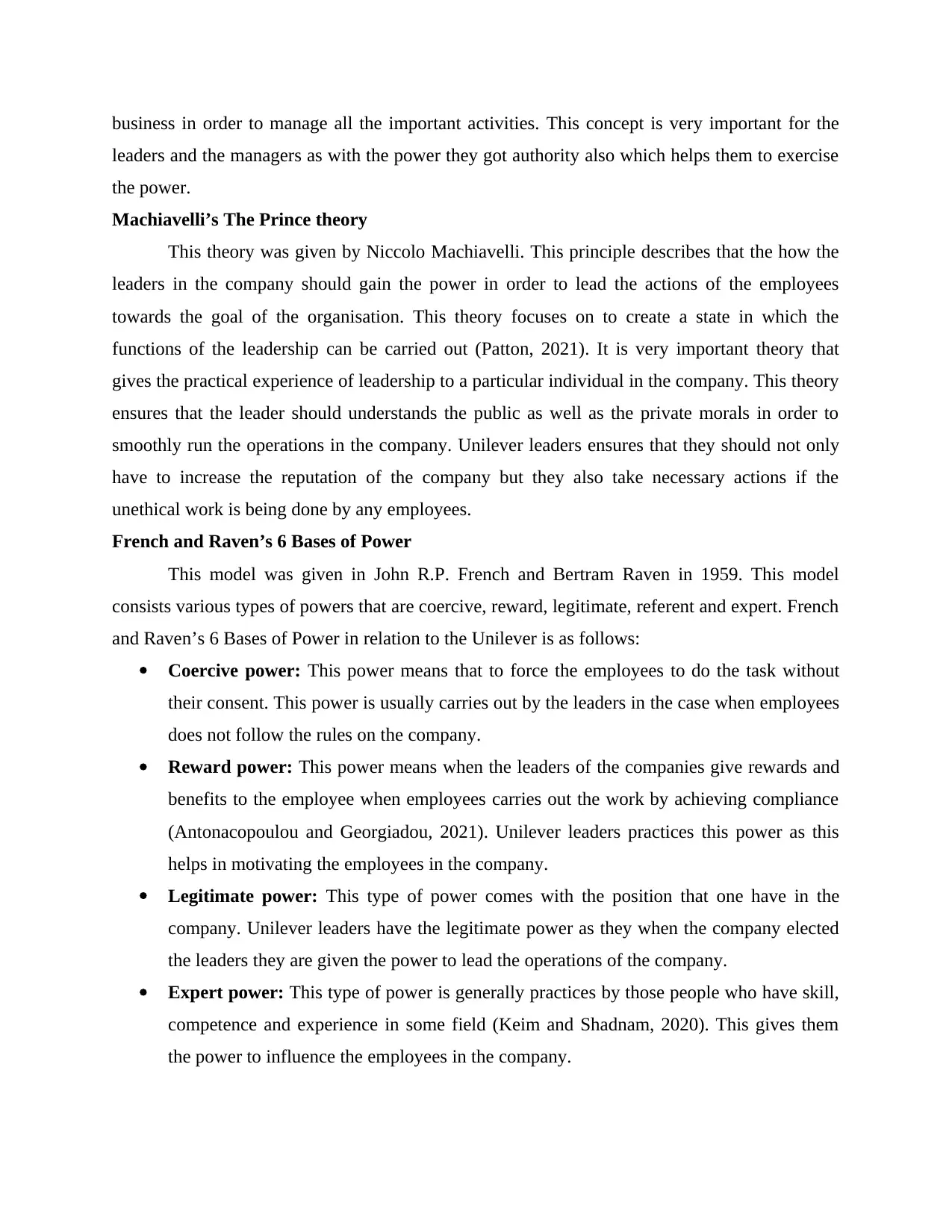
business in order to manage all the important activities. This concept is very important for the
leaders and the managers as with the power they got authority also which helps them to exercise
the power.
Machiavelli’s The Prince theory
This theory was given by Niccolo Machiavelli. This principle describes that the how the
leaders in the company should gain the power in order to lead the actions of the employees
towards the goal of the organisation. This theory focuses on to create a state in which the
functions of the leadership can be carried out (Patton, 2021). It is very important theory that
gives the practical experience of leadership to a particular individual in the company. This theory
ensures that the leader should understands the public as well as the private morals in order to
smoothly run the operations in the company. Unilever leaders ensures that they should not only
have to increase the reputation of the company but they also take necessary actions if the
unethical work is being done by any employees.
French and Raven’s 6 Bases of Power
This model was given in John R.P. French and Bertram Raven in 1959. This model
consists various types of powers that are coercive, reward, legitimate, referent and expert. French
and Raven’s 6 Bases of Power in relation to the Unilever is as follows:
Coercive power: This power means that to force the employees to do the task without
their consent. This power is usually carries out by the leaders in the case when employees
does not follow the rules on the company.
Reward power: This power means when the leaders of the companies give rewards and
benefits to the employee when employees carries out the work by achieving compliance
(Antonacopoulou and Georgiadou, 2021). Unilever leaders practices this power as this
helps in motivating the employees in the company.
Legitimate power: This type of power comes with the position that one have in the
company. Unilever leaders have the legitimate power as they when the company elected
the leaders they are given the power to lead the operations of the company.
Expert power: This type of power is generally practices by those people who have skill,
competence and experience in some field (Keim and Shadnam, 2020). This gives them
the power to influence the employees in the company.
leaders and the managers as with the power they got authority also which helps them to exercise
the power.
Machiavelli’s The Prince theory
This theory was given by Niccolo Machiavelli. This principle describes that the how the
leaders in the company should gain the power in order to lead the actions of the employees
towards the goal of the organisation. This theory focuses on to create a state in which the
functions of the leadership can be carried out (Patton, 2021). It is very important theory that
gives the practical experience of leadership to a particular individual in the company. This theory
ensures that the leader should understands the public as well as the private morals in order to
smoothly run the operations in the company. Unilever leaders ensures that they should not only
have to increase the reputation of the company but they also take necessary actions if the
unethical work is being done by any employees.
French and Raven’s 6 Bases of Power
This model was given in John R.P. French and Bertram Raven in 1959. This model
consists various types of powers that are coercive, reward, legitimate, referent and expert. French
and Raven’s 6 Bases of Power in relation to the Unilever is as follows:
Coercive power: This power means that to force the employees to do the task without
their consent. This power is usually carries out by the leaders in the case when employees
does not follow the rules on the company.
Reward power: This power means when the leaders of the companies give rewards and
benefits to the employee when employees carries out the work by achieving compliance
(Antonacopoulou and Georgiadou, 2021). Unilever leaders practices this power as this
helps in motivating the employees in the company.
Legitimate power: This type of power comes with the position that one have in the
company. Unilever leaders have the legitimate power as they when the company elected
the leaders they are given the power to lead the operations of the company.
Expert power: This type of power is generally practices by those people who have skill,
competence and experience in some field (Keim and Shadnam, 2020). This gives them
the power to influence the employees in the company.
Paraphrase This Document
Need a fresh take? Get an instant paraphrase of this document with our AI Paraphraser
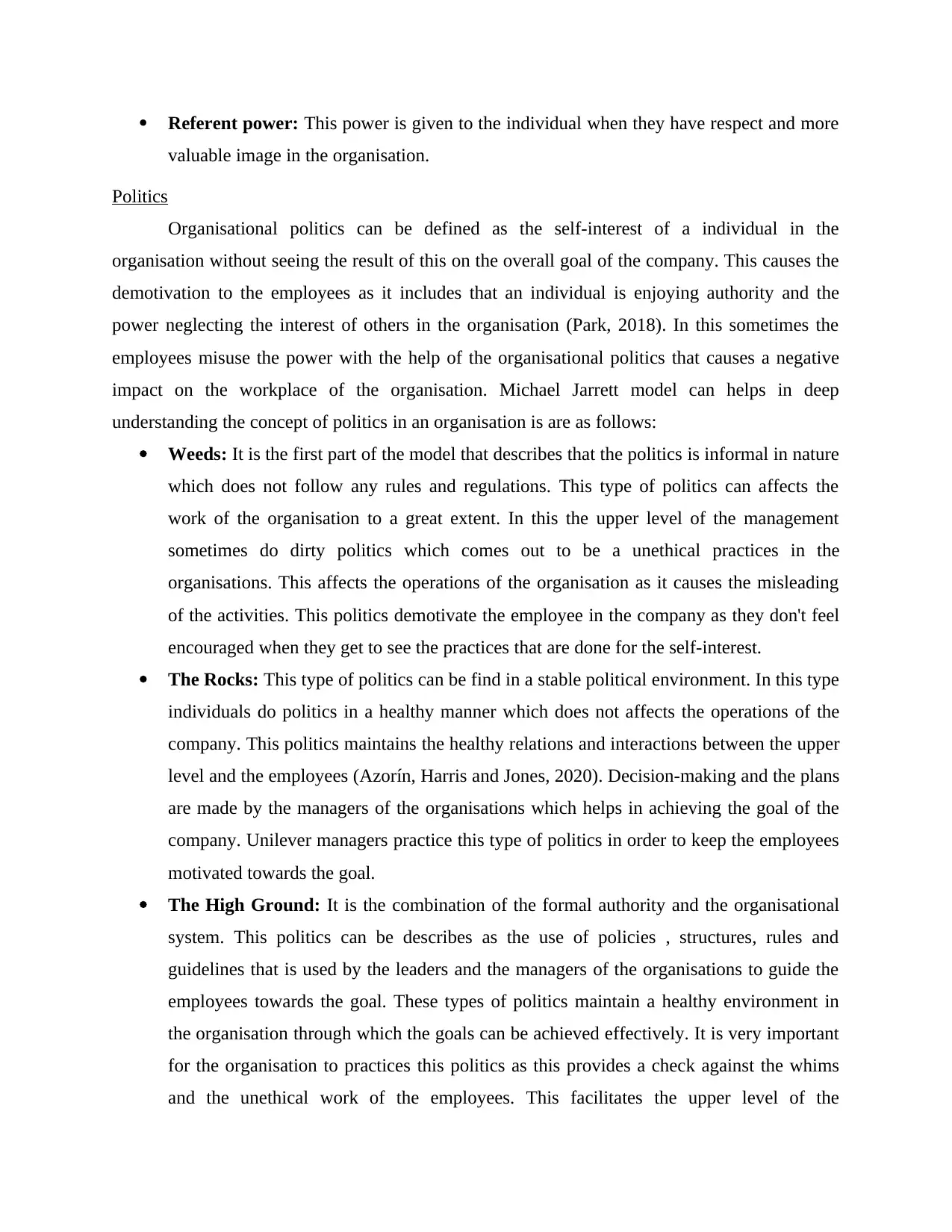
Referent power: This power is given to the individual when they have respect and more
valuable image in the organisation.
Politics
Organisational politics can be defined as the self-interest of a individual in the
organisation without seeing the result of this on the overall goal of the company. This causes the
demotivation to the employees as it includes that an individual is enjoying authority and the
power neglecting the interest of others in the organisation (Park, 2018). In this sometimes the
employees misuse the power with the help of the organisational politics that causes a negative
impact on the workplace of the organisation. Michael Jarrett model can helps in deep
understanding the concept of politics in an organisation is are as follows:
Weeds: It is the first part of the model that describes that the politics is informal in nature
which does not follow any rules and regulations. This type of politics can affects the
work of the organisation to a great extent. In this the upper level of the management
sometimes do dirty politics which comes out to be a unethical practices in the
organisations. This affects the operations of the organisation as it causes the misleading
of the activities. This politics demotivate the employee in the company as they don't feel
encouraged when they get to see the practices that are done for the self-interest.
The Rocks: This type of politics can be find in a stable political environment. In this type
individuals do politics in a healthy manner which does not affects the operations of the
company. This politics maintains the healthy relations and interactions between the upper
level and the employees (Azorín, Harris and Jones, 2020). Decision-making and the plans
are made by the managers of the organisations which helps in achieving the goal of the
company. Unilever managers practice this type of politics in order to keep the employees
motivated towards the goal.
The High Ground: It is the combination of the formal authority and the organisational
system. This politics can be describes as the use of policies , structures, rules and
guidelines that is used by the leaders and the managers of the organisations to guide the
employees towards the goal. These types of politics maintain a healthy environment in
the organisation through which the goals can be achieved effectively. It is very important
for the organisation to practices this politics as this provides a check against the whims
and the unethical work of the employees. This facilitates the upper level of the
valuable image in the organisation.
Politics
Organisational politics can be defined as the self-interest of a individual in the
organisation without seeing the result of this on the overall goal of the company. This causes the
demotivation to the employees as it includes that an individual is enjoying authority and the
power neglecting the interest of others in the organisation (Park, 2018). In this sometimes the
employees misuse the power with the help of the organisational politics that causes a negative
impact on the workplace of the organisation. Michael Jarrett model can helps in deep
understanding the concept of politics in an organisation is are as follows:
Weeds: It is the first part of the model that describes that the politics is informal in nature
which does not follow any rules and regulations. This type of politics can affects the
work of the organisation to a great extent. In this the upper level of the management
sometimes do dirty politics which comes out to be a unethical practices in the
organisations. This affects the operations of the organisation as it causes the misleading
of the activities. This politics demotivate the employee in the company as they don't feel
encouraged when they get to see the practices that are done for the self-interest.
The Rocks: This type of politics can be find in a stable political environment. In this type
individuals do politics in a healthy manner which does not affects the operations of the
company. This politics maintains the healthy relations and interactions between the upper
level and the employees (Azorín, Harris and Jones, 2020). Decision-making and the plans
are made by the managers of the organisations which helps in achieving the goal of the
company. Unilever managers practice this type of politics in order to keep the employees
motivated towards the goal.
The High Ground: It is the combination of the formal authority and the organisational
system. This politics can be describes as the use of policies , structures, rules and
guidelines that is used by the leaders and the managers of the organisations to guide the
employees towards the goal. These types of politics maintain a healthy environment in
the organisation through which the goals can be achieved effectively. It is very important
for the organisation to practices this politics as this provides a check against the whims
and the unethical work of the employees. This facilitates the upper level of the
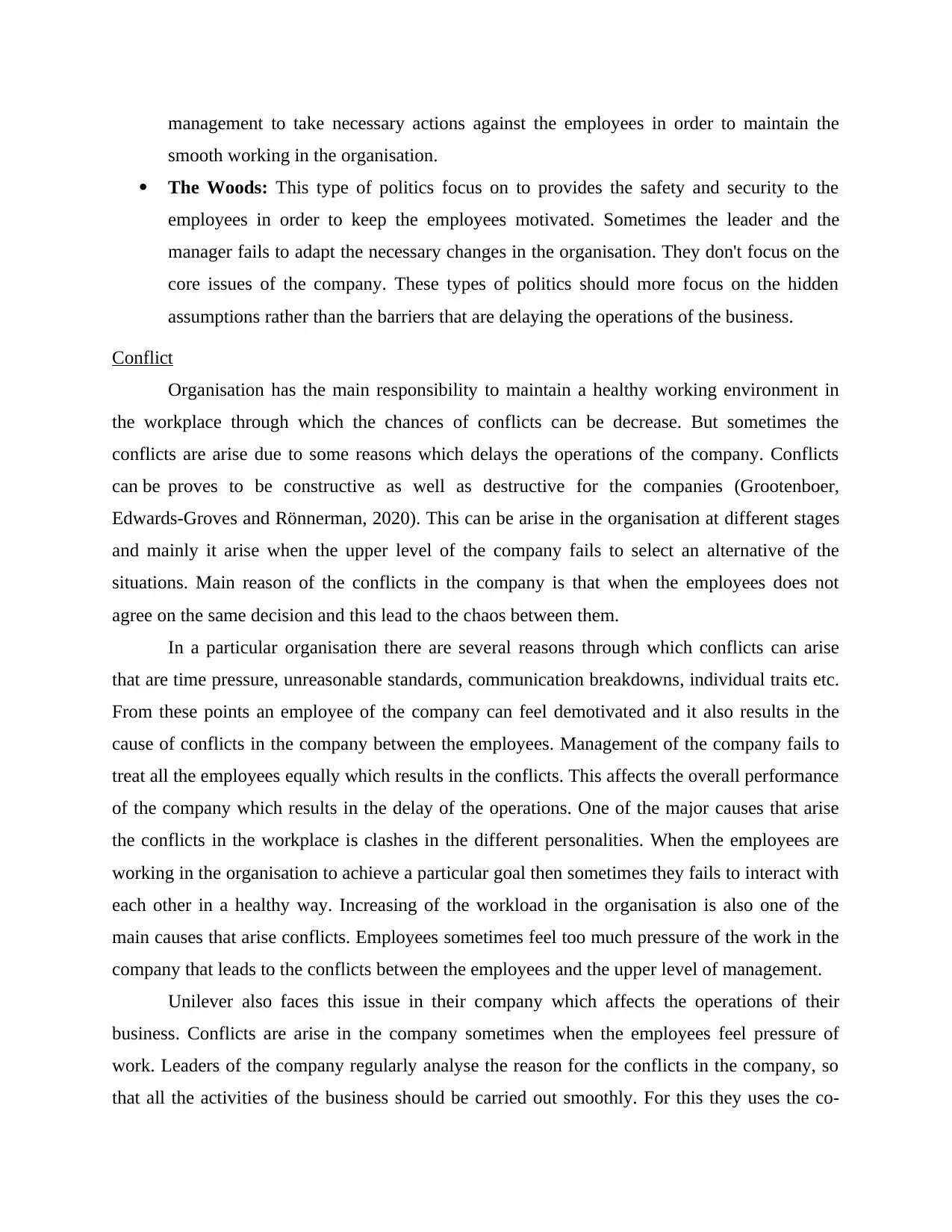
management to take necessary actions against the employees in order to maintain the
smooth working in the organisation.
The Woods: This type of politics focus on to provides the safety and security to the
employees in order to keep the employees motivated. Sometimes the leader and the
manager fails to adapt the necessary changes in the organisation. They don't focus on the
core issues of the company. These types of politics should more focus on the hidden
assumptions rather than the barriers that are delaying the operations of the business.
Conflict
Organisation has the main responsibility to maintain a healthy working environment in
the workplace through which the chances of conflicts can be decrease. But sometimes the
conflicts are arise due to some reasons which delays the operations of the company. Conflicts
can be proves to be constructive as well as destructive for the companies (Grootenboer,
Edwards-Groves and Rönnerman, 2020). This can be arise in the organisation at different stages
and mainly it arise when the upper level of the company fails to select an alternative of the
situations. Main reason of the conflicts in the company is that when the employees does not
agree on the same decision and this lead to the chaos between them.
In a particular organisation there are several reasons through which conflicts can arise
that are time pressure, unreasonable standards, communication breakdowns, individual traits etc.
From these points an employee of the company can feel demotivated and it also results in the
cause of conflicts in the company between the employees. Management of the company fails to
treat all the employees equally which results in the conflicts. This affects the overall performance
of the company which results in the delay of the operations. One of the major causes that arise
the conflicts in the workplace is clashes in the different personalities. When the employees are
working in the organisation to achieve a particular goal then sometimes they fails to interact with
each other in a healthy way. Increasing of the workload in the organisation is also one of the
main causes that arise conflicts. Employees sometimes feel too much pressure of the work in the
company that leads to the conflicts between the employees and the upper level of management.
Unilever also faces this issue in their company which affects the operations of their
business. Conflicts are arise in the company sometimes when the employees feel pressure of
work. Leaders of the company regularly analyse the reason for the conflicts in the company, so
that all the activities of the business should be carried out smoothly. For this they uses the co-
smooth working in the organisation.
The Woods: This type of politics focus on to provides the safety and security to the
employees in order to keep the employees motivated. Sometimes the leader and the
manager fails to adapt the necessary changes in the organisation. They don't focus on the
core issues of the company. These types of politics should more focus on the hidden
assumptions rather than the barriers that are delaying the operations of the business.
Conflict
Organisation has the main responsibility to maintain a healthy working environment in
the workplace through which the chances of conflicts can be decrease. But sometimes the
conflicts are arise due to some reasons which delays the operations of the company. Conflicts
can be proves to be constructive as well as destructive for the companies (Grootenboer,
Edwards-Groves and Rönnerman, 2020). This can be arise in the organisation at different stages
and mainly it arise when the upper level of the company fails to select an alternative of the
situations. Main reason of the conflicts in the company is that when the employees does not
agree on the same decision and this lead to the chaos between them.
In a particular organisation there are several reasons through which conflicts can arise
that are time pressure, unreasonable standards, communication breakdowns, individual traits etc.
From these points an employee of the company can feel demotivated and it also results in the
cause of conflicts in the company between the employees. Management of the company fails to
treat all the employees equally which results in the conflicts. This affects the overall performance
of the company which results in the delay of the operations. One of the major causes that arise
the conflicts in the workplace is clashes in the different personalities. When the employees are
working in the organisation to achieve a particular goal then sometimes they fails to interact with
each other in a healthy way. Increasing of the workload in the organisation is also one of the
main causes that arise conflicts. Employees sometimes feel too much pressure of the work in the
company that leads to the conflicts between the employees and the upper level of management.
Unilever also faces this issue in their company which affects the operations of their
business. Conflicts are arise in the company sometimes when the employees feel pressure of
work. Leaders of the company regularly analyse the reason for the conflicts in the company, so
that all the activities of the business should be carried out smoothly. For this they uses the co-
⊘ This is a preview!⊘
Do you want full access?
Subscribe today to unlock all pages.

Trusted by 1+ million students worldwide
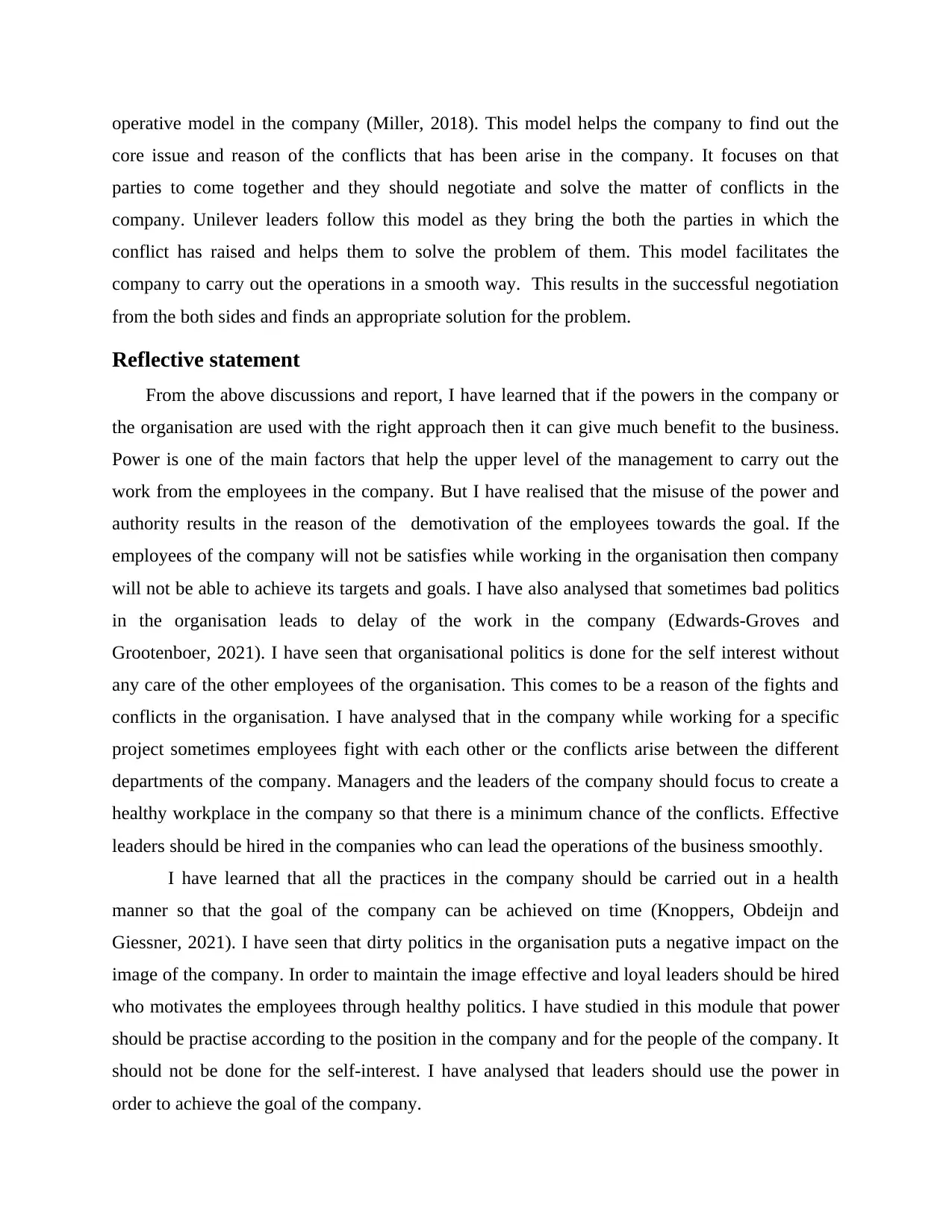
operative model in the company (Miller, 2018). This model helps the company to find out the
core issue and reason of the conflicts that has been arise in the company. It focuses on that
parties to come together and they should negotiate and solve the matter of conflicts in the
company. Unilever leaders follow this model as they bring the both the parties in which the
conflict has raised and helps them to solve the problem of them. This model facilitates the
company to carry out the operations in a smooth way. This results in the successful negotiation
from the both sides and finds an appropriate solution for the problem.
Reflective statement
From the above discussions and report, I have learned that if the powers in the company or
the organisation are used with the right approach then it can give much benefit to the business.
Power is one of the main factors that help the upper level of the management to carry out the
work from the employees in the company. But I have realised that the misuse of the power and
authority results in the reason of the demotivation of the employees towards the goal. If the
employees of the company will not be satisfies while working in the organisation then company
will not be able to achieve its targets and goals. I have also analysed that sometimes bad politics
in the organisation leads to delay of the work in the company (Edwards-Groves and
Grootenboer, 2021). I have seen that organisational politics is done for the self interest without
any care of the other employees of the organisation. This comes to be a reason of the fights and
conflicts in the organisation. I have analysed that in the company while working for a specific
project sometimes employees fight with each other or the conflicts arise between the different
departments of the company. Managers and the leaders of the company should focus to create a
healthy workplace in the company so that there is a minimum chance of the conflicts. Effective
leaders should be hired in the companies who can lead the operations of the business smoothly.
I have learned that all the practices in the company should be carried out in a health
manner so that the goal of the company can be achieved on time (Knoppers, Obdeijn and
Giessner, 2021). I have seen that dirty politics in the organisation puts a negative impact on the
image of the company. In order to maintain the image effective and loyal leaders should be hired
who motivates the employees through healthy politics. I have studied in this module that power
should be practise according to the position in the company and for the people of the company. It
should not be done for the self-interest. I have analysed that leaders should use the power in
order to achieve the goal of the company.
core issue and reason of the conflicts that has been arise in the company. It focuses on that
parties to come together and they should negotiate and solve the matter of conflicts in the
company. Unilever leaders follow this model as they bring the both the parties in which the
conflict has raised and helps them to solve the problem of them. This model facilitates the
company to carry out the operations in a smooth way. This results in the successful negotiation
from the both sides and finds an appropriate solution for the problem.
Reflective statement
From the above discussions and report, I have learned that if the powers in the company or
the organisation are used with the right approach then it can give much benefit to the business.
Power is one of the main factors that help the upper level of the management to carry out the
work from the employees in the company. But I have realised that the misuse of the power and
authority results in the reason of the demotivation of the employees towards the goal. If the
employees of the company will not be satisfies while working in the organisation then company
will not be able to achieve its targets and goals. I have also analysed that sometimes bad politics
in the organisation leads to delay of the work in the company (Edwards-Groves and
Grootenboer, 2021). I have seen that organisational politics is done for the self interest without
any care of the other employees of the organisation. This comes to be a reason of the fights and
conflicts in the organisation. I have analysed that in the company while working for a specific
project sometimes employees fight with each other or the conflicts arise between the different
departments of the company. Managers and the leaders of the company should focus to create a
healthy workplace in the company so that there is a minimum chance of the conflicts. Effective
leaders should be hired in the companies who can lead the operations of the business smoothly.
I have learned that all the practices in the company should be carried out in a health
manner so that the goal of the company can be achieved on time (Knoppers, Obdeijn and
Giessner, 2021). I have seen that dirty politics in the organisation puts a negative impact on the
image of the company. In order to maintain the image effective and loyal leaders should be hired
who motivates the employees through healthy politics. I have studied in this module that power
should be practise according to the position in the company and for the people of the company. It
should not be done for the self-interest. I have analysed that leaders should use the power in
order to achieve the goal of the company.
Paraphrase This Document
Need a fresh take? Get an instant paraphrase of this document with our AI Paraphraser
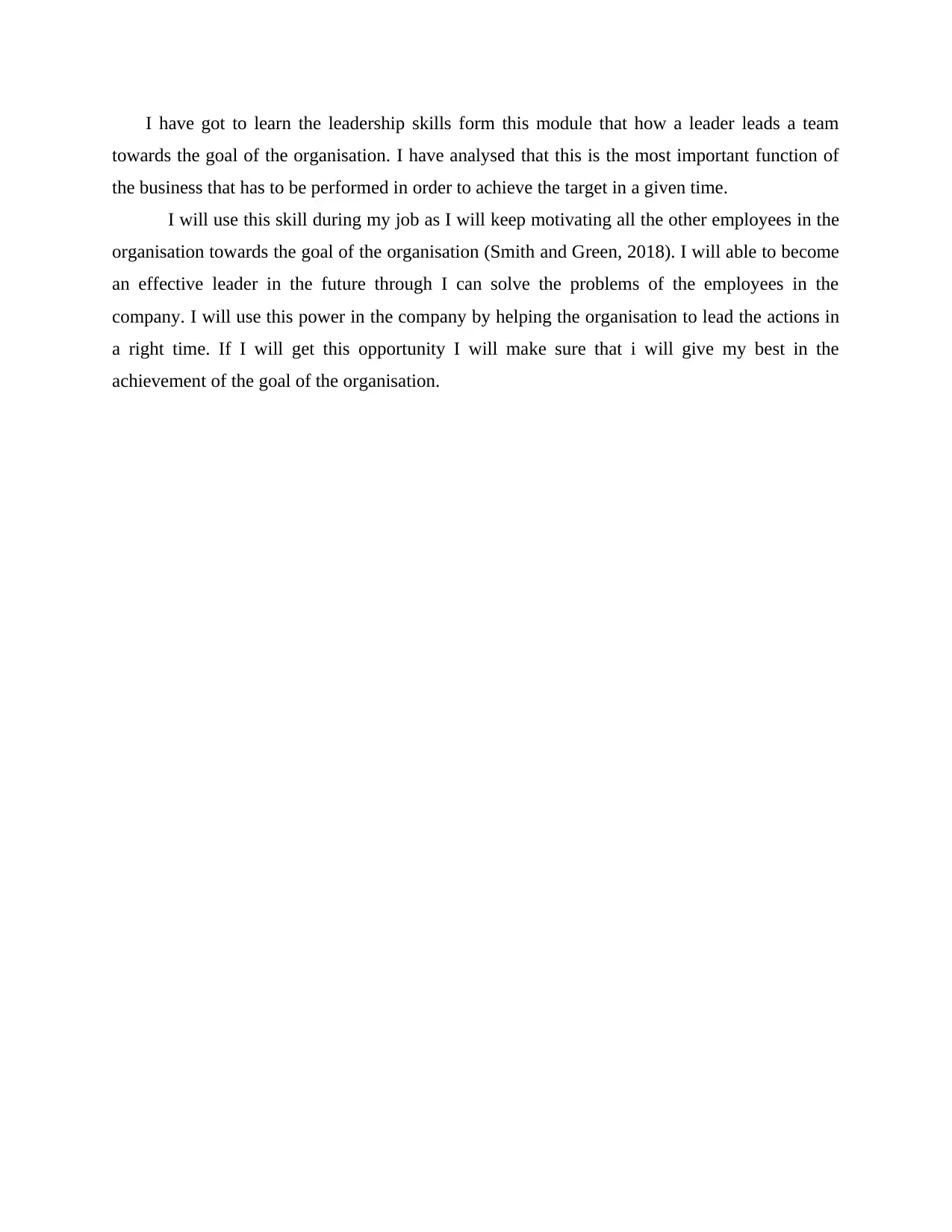
I have got to learn the leadership skills form this module that how a leader leads a team
towards the goal of the organisation. I have analysed that this is the most important function of
the business that has to be performed in order to achieve the target in a given time.
I will use this skill during my job as I will keep motivating all the other employees in the
organisation towards the goal of the organisation (Smith and Green, 2018). I will able to become
an effective leader in the future through I can solve the problems of the employees in the
company. I will use this power in the company by helping the organisation to lead the actions in
a right time. If I will get this opportunity I will make sure that i will give my best in the
achievement of the goal of the organisation.
towards the goal of the organisation. I have analysed that this is the most important function of
the business that has to be performed in order to achieve the target in a given time.
I will use this skill during my job as I will keep motivating all the other employees in the
organisation towards the goal of the organisation (Smith and Green, 2018). I will able to become
an effective leader in the future through I can solve the problems of the employees in the
company. I will use this power in the company by helping the organisation to lead the actions in
a right time. If I will get this opportunity I will make sure that i will give my best in the
achievement of the goal of the organisation.
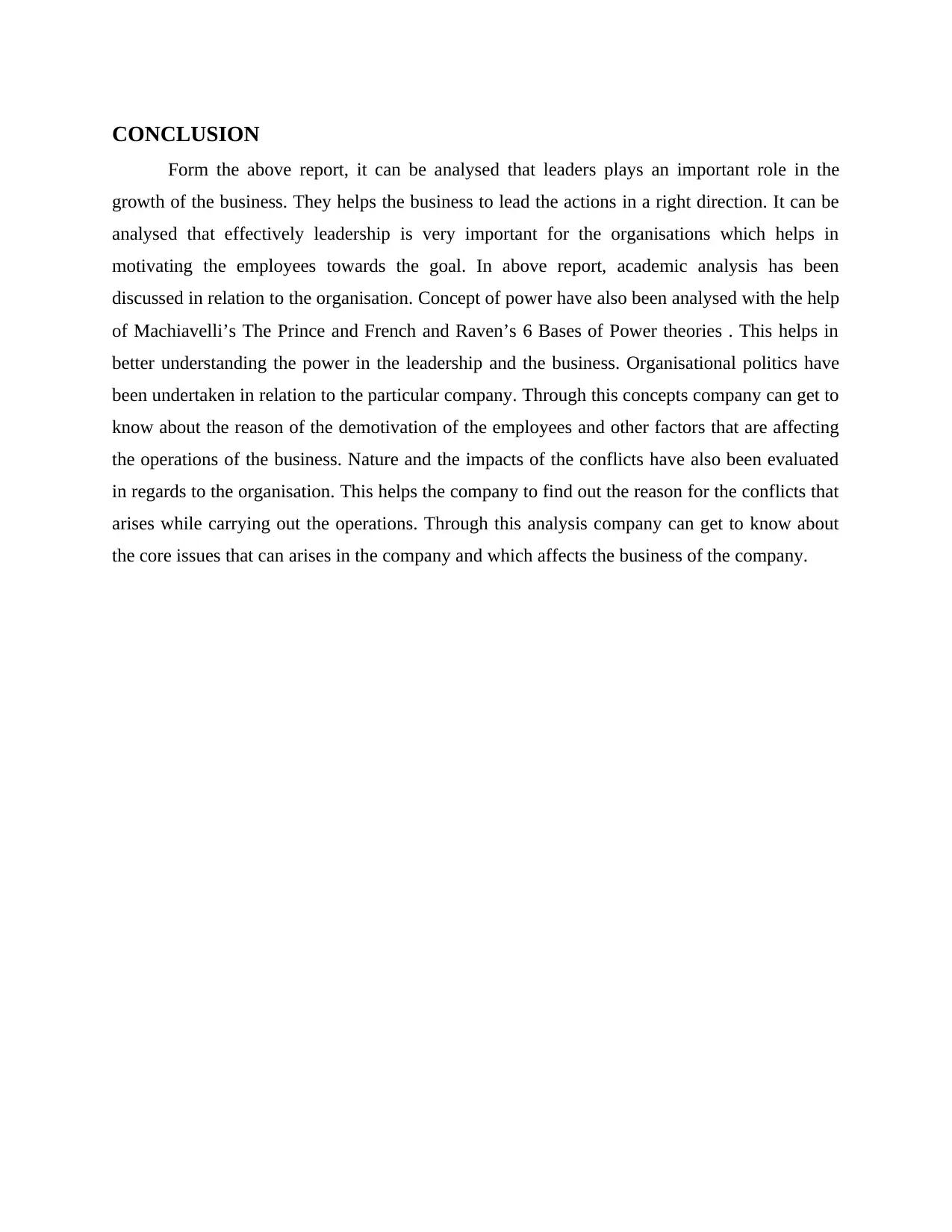
CONCLUSION
Form the above report, it can be analysed that leaders plays an important role in the
growth of the business. They helps the business to lead the actions in a right direction. It can be
analysed that effectively leadership is very important for the organisations which helps in
motivating the employees towards the goal. In above report, academic analysis has been
discussed in relation to the organisation. Concept of power have also been analysed with the help
of Machiavelli’s The Prince and French and Raven’s 6 Bases of Power theories . This helps in
better understanding the power in the leadership and the business. Organisational politics have
been undertaken in relation to the particular company. Through this concepts company can get to
know about the reason of the demotivation of the employees and other factors that are affecting
the operations of the business. Nature and the impacts of the conflicts have also been evaluated
in regards to the organisation. This helps the company to find out the reason for the conflicts that
arises while carrying out the operations. Through this analysis company can get to know about
the core issues that can arises in the company and which affects the business of the company.
Form the above report, it can be analysed that leaders plays an important role in the
growth of the business. They helps the business to lead the actions in a right direction. It can be
analysed that effectively leadership is very important for the organisations which helps in
motivating the employees towards the goal. In above report, academic analysis has been
discussed in relation to the organisation. Concept of power have also been analysed with the help
of Machiavelli’s The Prince and French and Raven’s 6 Bases of Power theories . This helps in
better understanding the power in the leadership and the business. Organisational politics have
been undertaken in relation to the particular company. Through this concepts company can get to
know about the reason of the demotivation of the employees and other factors that are affecting
the operations of the business. Nature and the impacts of the conflicts have also been evaluated
in regards to the organisation. This helps the company to find out the reason for the conflicts that
arises while carrying out the operations. Through this analysis company can get to know about
the core issues that can arises in the company and which affects the business of the company.
⊘ This is a preview!⊘
Do you want full access?
Subscribe today to unlock all pages.

Trusted by 1+ million students worldwide
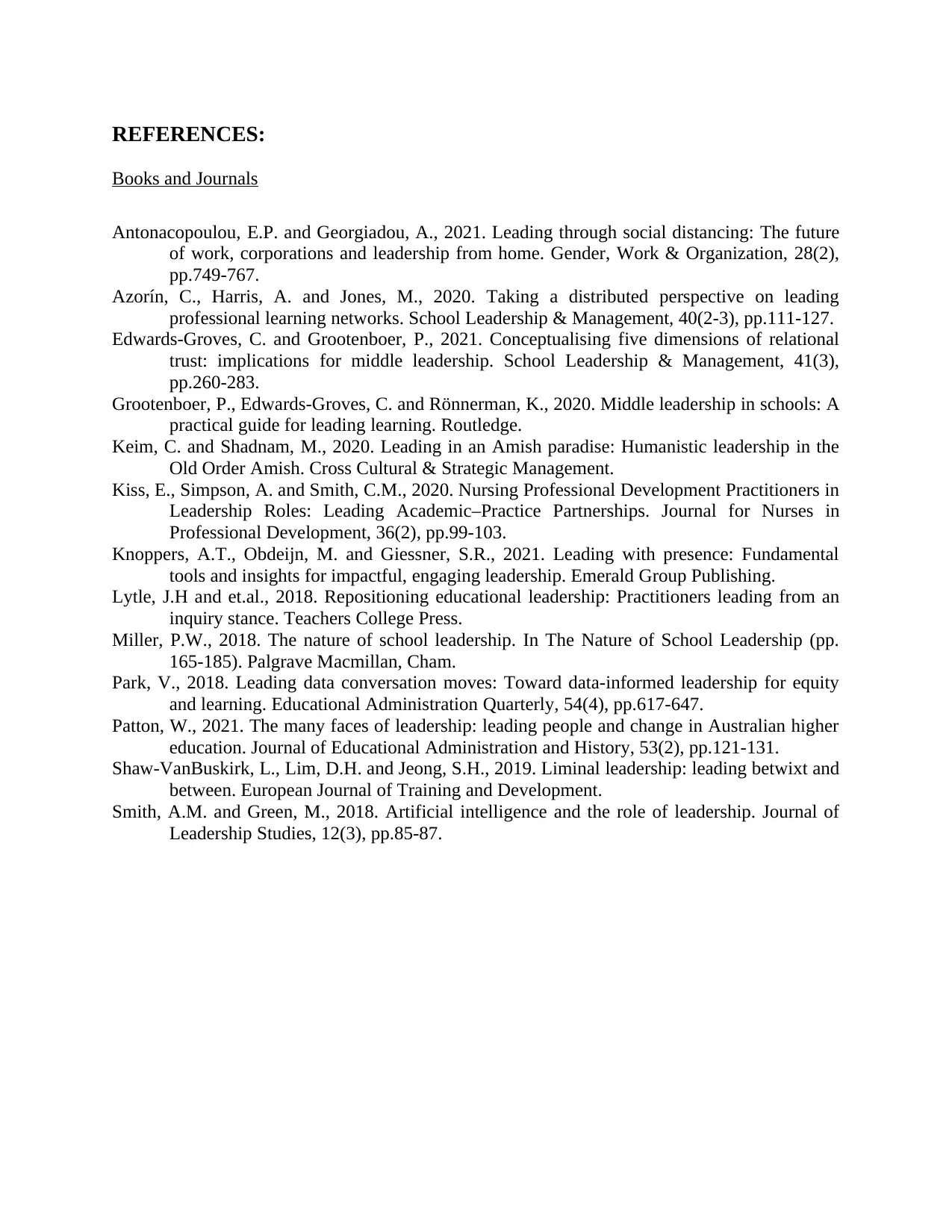
REFERENCES:
Books and Journals
Antonacopoulou, E.P. and Georgiadou, A., 2021. Leading through social distancing: The future
of work, corporations and leadership from home. Gender, Work & Organization, 28(2),
pp.749-767.
Azorín, C., Harris, A. and Jones, M., 2020. Taking a distributed perspective on leading
professional learning networks. School Leadership & Management, 40(2-3), pp.111-127.
Edwards-Groves, C. and Grootenboer, P., 2021. Conceptualising five dimensions of relational
trust: implications for middle leadership. School Leadership & Management, 41(3),
pp.260-283.
Grootenboer, P., Edwards-Groves, C. and Rönnerman, K., 2020. Middle leadership in schools: A
practical guide for leading learning. Routledge.
Keim, C. and Shadnam, M., 2020. Leading in an Amish paradise: Humanistic leadership in the
Old Order Amish. Cross Cultural & Strategic Management.
Kiss, E., Simpson, A. and Smith, C.M., 2020. Nursing Professional Development Practitioners in
Leadership Roles: Leading Academic–Practice Partnerships. Journal for Nurses in
Professional Development, 36(2), pp.99-103.
Knoppers, A.T., Obdeijn, M. and Giessner, S.R., 2021. Leading with presence: Fundamental
tools and insights for impactful, engaging leadership. Emerald Group Publishing.
Lytle, J.H and et.al., 2018. Repositioning educational leadership: Practitioners leading from an
inquiry stance. Teachers College Press.
Miller, P.W., 2018. The nature of school leadership. In The Nature of School Leadership (pp.
165-185). Palgrave Macmillan, Cham.
Park, V., 2018. Leading data conversation moves: Toward data-informed leadership for equity
and learning. Educational Administration Quarterly, 54(4), pp.617-647.
Patton, W., 2021. The many faces of leadership: leading people and change in Australian higher
education. Journal of Educational Administration and History, 53(2), pp.121-131.
Shaw-VanBuskirk, L., Lim, D.H. and Jeong, S.H., 2019. Liminal leadership: leading betwixt and
between. European Journal of Training and Development.
Smith, A.M. and Green, M., 2018. Artificial intelligence and the role of leadership. Journal of
Leadership Studies, 12(3), pp.85-87.
Books and Journals
Antonacopoulou, E.P. and Georgiadou, A., 2021. Leading through social distancing: The future
of work, corporations and leadership from home. Gender, Work & Organization, 28(2),
pp.749-767.
Azorín, C., Harris, A. and Jones, M., 2020. Taking a distributed perspective on leading
professional learning networks. School Leadership & Management, 40(2-3), pp.111-127.
Edwards-Groves, C. and Grootenboer, P., 2021. Conceptualising five dimensions of relational
trust: implications for middle leadership. School Leadership & Management, 41(3),
pp.260-283.
Grootenboer, P., Edwards-Groves, C. and Rönnerman, K., 2020. Middle leadership in schools: A
practical guide for leading learning. Routledge.
Keim, C. and Shadnam, M., 2020. Leading in an Amish paradise: Humanistic leadership in the
Old Order Amish. Cross Cultural & Strategic Management.
Kiss, E., Simpson, A. and Smith, C.M., 2020. Nursing Professional Development Practitioners in
Leadership Roles: Leading Academic–Practice Partnerships. Journal for Nurses in
Professional Development, 36(2), pp.99-103.
Knoppers, A.T., Obdeijn, M. and Giessner, S.R., 2021. Leading with presence: Fundamental
tools and insights for impactful, engaging leadership. Emerald Group Publishing.
Lytle, J.H and et.al., 2018. Repositioning educational leadership: Practitioners leading from an
inquiry stance. Teachers College Press.
Miller, P.W., 2018. The nature of school leadership. In The Nature of School Leadership (pp.
165-185). Palgrave Macmillan, Cham.
Park, V., 2018. Leading data conversation moves: Toward data-informed leadership for equity
and learning. Educational Administration Quarterly, 54(4), pp.617-647.
Patton, W., 2021. The many faces of leadership: leading people and change in Australian higher
education. Journal of Educational Administration and History, 53(2), pp.121-131.
Shaw-VanBuskirk, L., Lim, D.H. and Jeong, S.H., 2019. Liminal leadership: leading betwixt and
between. European Journal of Training and Development.
Smith, A.M. and Green, M., 2018. Artificial intelligence and the role of leadership. Journal of
Leadership Studies, 12(3), pp.85-87.
Paraphrase This Document
Need a fresh take? Get an instant paraphrase of this document with our AI Paraphraser
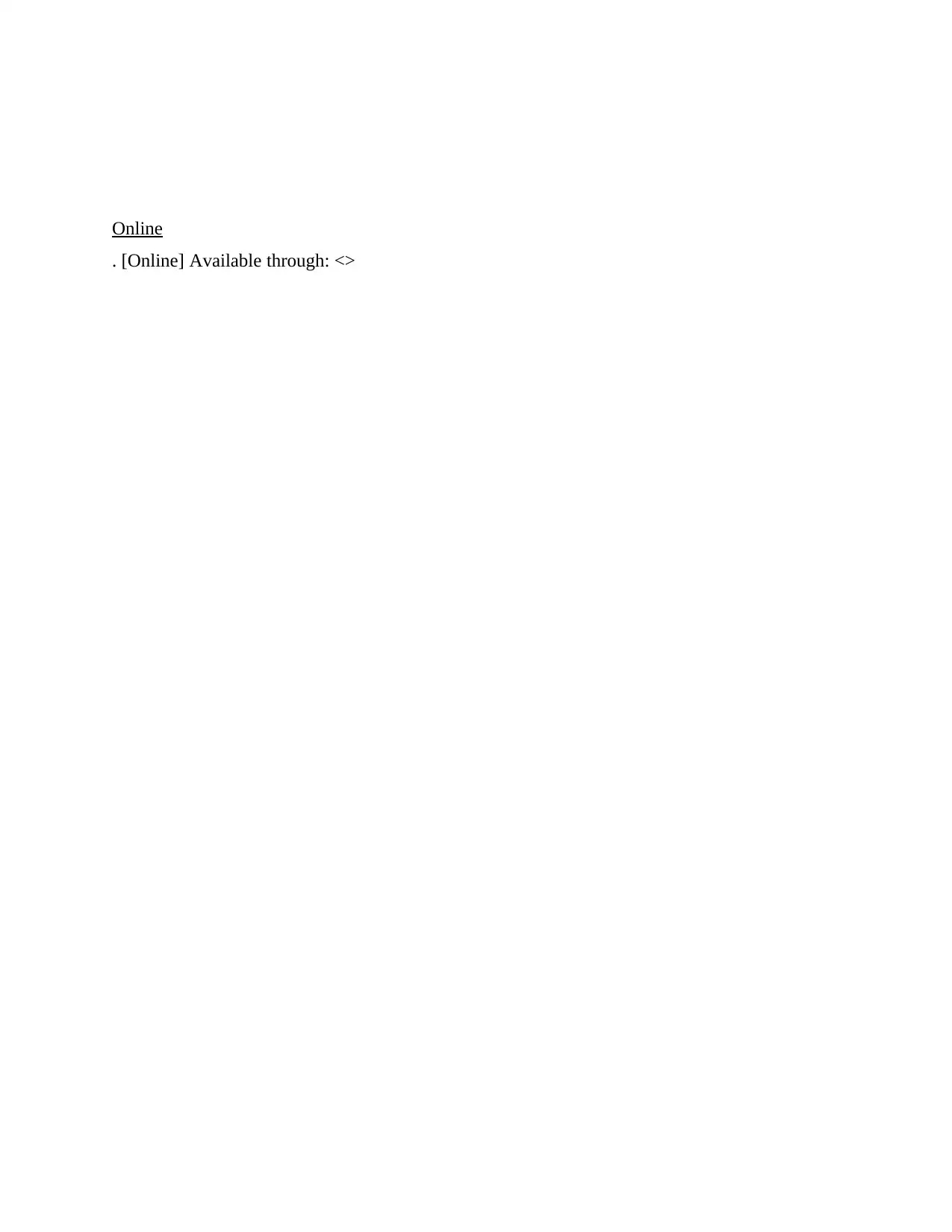
Online
. [Online] Available through: <>
. [Online] Available through: <>
1 out of 11
Related Documents
Your All-in-One AI-Powered Toolkit for Academic Success.
+13062052269
info@desklib.com
Available 24*7 on WhatsApp / Email
![[object Object]](/_next/static/media/star-bottom.7253800d.svg)
Unlock your academic potential
Copyright © 2020–2025 A2Z Services. All Rights Reserved. Developed and managed by ZUCOL.





